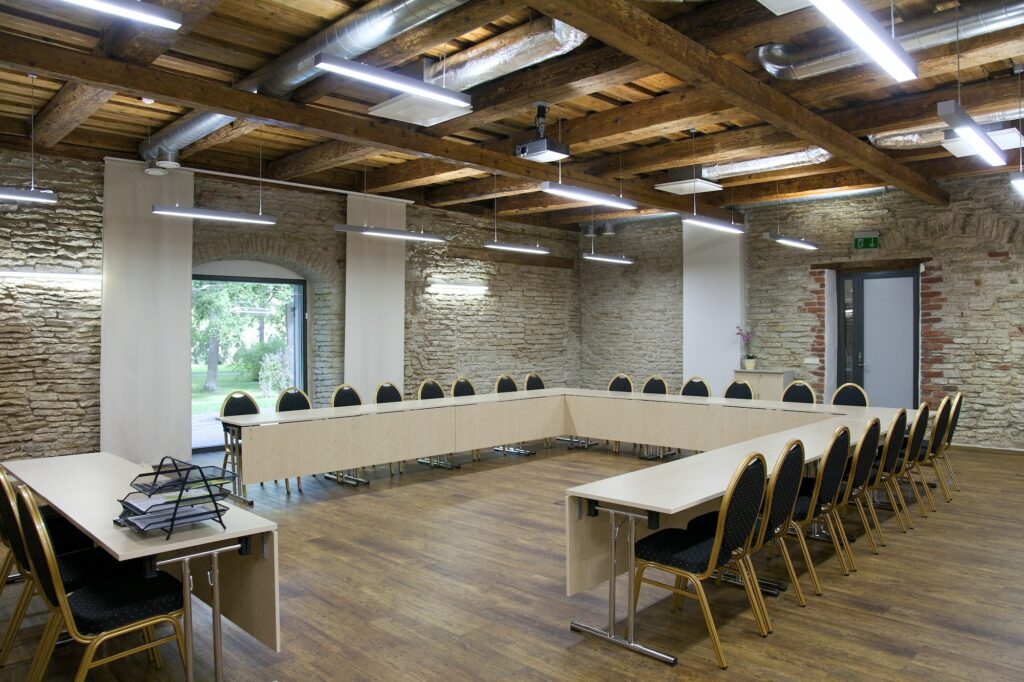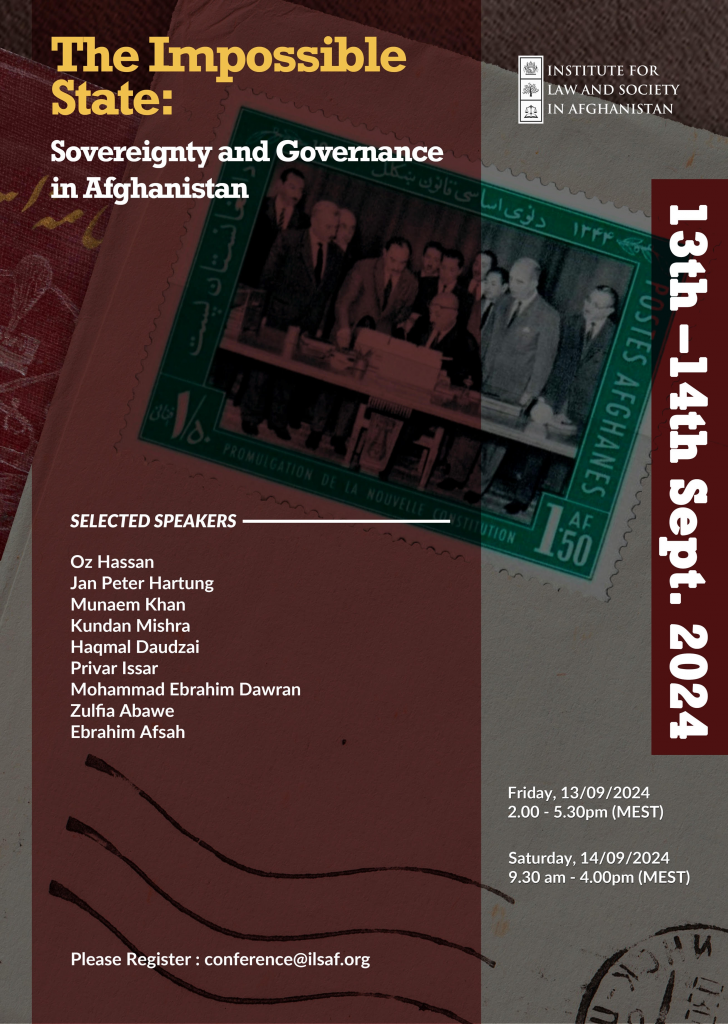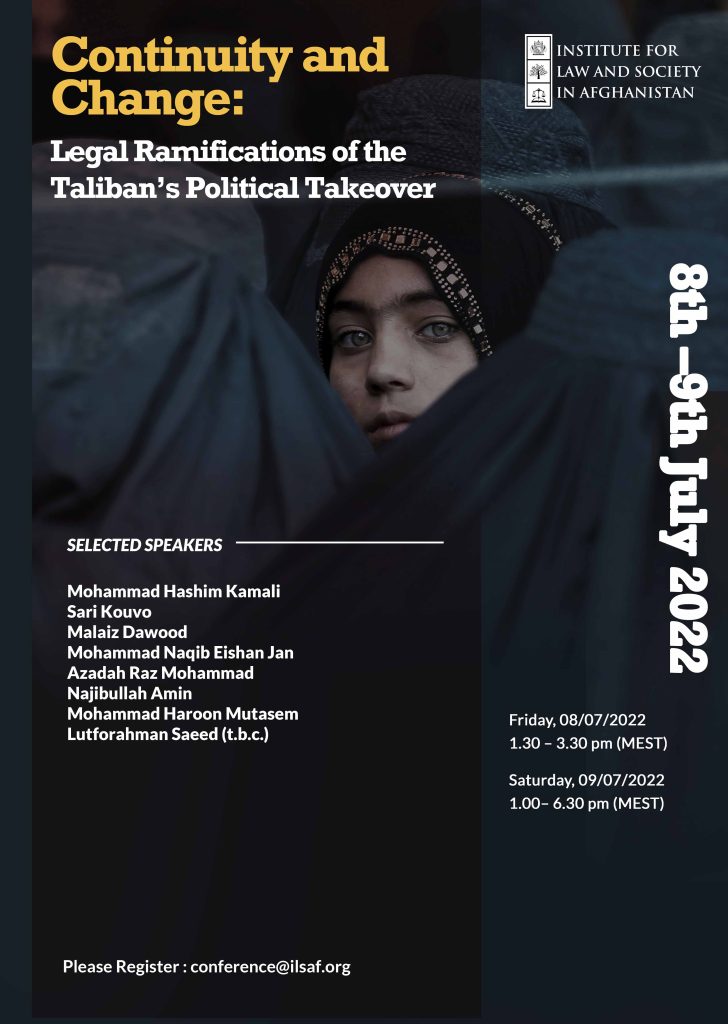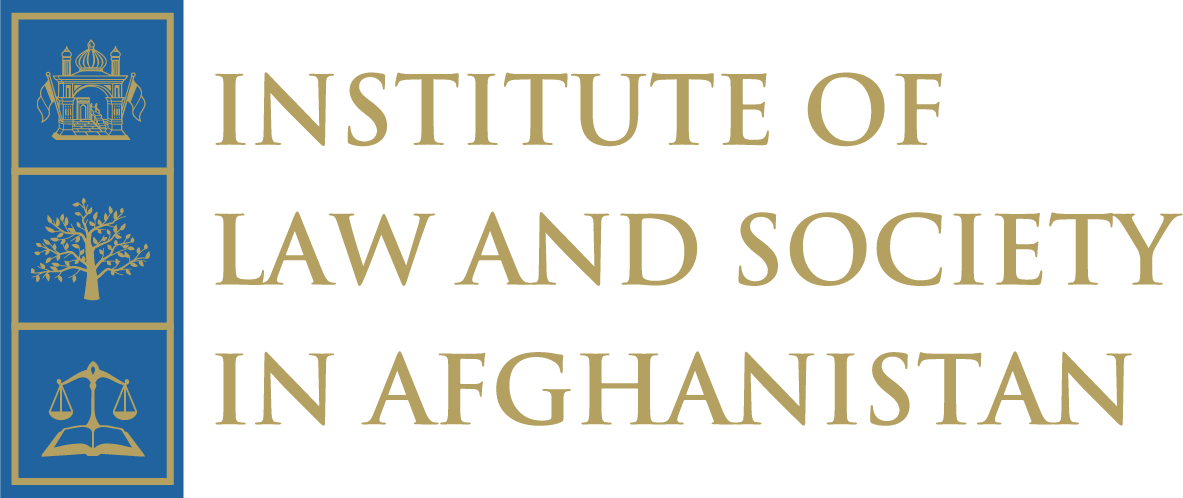Conferences
About

The series of annual Afghan Legal Studies Conferences (ALSC) began in 2014. While the first events were held in Kabul, the ILSAF decided to re-launch the series in digital format in 2022.
The aim of the ALSC series is to provide a forum for scholars from Afghanistan and abroad where they can present and discuss fresh research results. By this, ILSAF would like to strengthen the exchange among Afghan professors, Ph.D. students and independent researchers, and connect them with the international scientific community. This aim is ever more important since large numbers of Afghan academics left the country after the regime change in 2021. Despite the difficult circumstances, ILSAF wants to contribute to the development of an independent Afghan community of researchers.
Thematic areas that have been covered at ALSC conferences include public, private, criminal, and international law; Islamic law; non-state justice and restorative justice; rule of law; and access to justice. ILSAF will also ensure that presentations from the areas of (legal) history, sociology, anthropology, theory, and philosophy find their place in future events.
ALSC 2024
Topic
On 13-14 September 2024, ILSAF hosted the eighth ALSC with the overarching theme, “The Impossible State: Sovereignty and Governance in Afghanistan”.
Concept
The conference delved into Afghanistan’s complex journey through sovereignty, identity, and governance, bringing together scholars to examine its unique socio-political landscape at the intersections of law, society, and religion.
The event aimed to offer a comprehensive perspective on Afghanistan’s legal and social development, focusing on key historical milestones that have shaped the country’s governance and state identity. Major topics included the codification of laws, the role of Islamic law, the impact of foreign interventions, and the persistent challenges to Afghan sovereignty. By exploring these pivotal themes, the conference aimed to illuminate the nuanced relationship between legal systems and societal norms in Afghanistan.
Framed around the concept of the „Impossible State,“ this scholarly gathering addressed the complex challenges Afghanistan faces and examined potential pathways for the country’s ongoing quest for stability and identity.
Program
Panel I: Sovereignty, Divine Rule, and International Law (Chair: Idris Nassery)
Jan Peter Hartung: Standardizing Hanafi Fiqh in the Islamic Emirate
Munaeem Khan: The Cause and Solution of the Impossibility of Taliban State International Law
Panel II: Identity, Law, and Society (Chair; Suhailah Akbari)
Kundan Mishra: A Messy Balance—A Comparative Study of Afghanistan Constitutions and Human Rights Institutions
Haqmal Daudzai: Consociational Democracy as a Path to Afghan Political Stability
Privar Issar: The Durand Line and the Greater Demand for Pashtunistan
Mohammad Ibrahim Dawran: The Long and Winding Road of Political Party Rights in Afghanistan
Panel III: International Interventions (Chair: Tilmann Röder)
Zulfia Abawe: A Relational Critique of Foreign Interventions in Developing Countries: Unravelling the Complex Dynamics of Violence and Nonviolence in Afghanistan 2002-2021
Ebrahim Afsah: Why Foreign-Funded Sovereignty is Impossible: Ambition, Resistance, and Administrative Capacity in Afghanistan

ALSC 2023
Topic
On 29-30 September 2023, ILSAF held the seventh ALSC with the main theme being “Unraveling the Economic Crisis in Afghanistan: Legal, Economic, and Political Insights”.
Concept
The political crisis of 2021 had a massive impact on the Afghan economy. The inflow of foreign funds abruptly ceased, Afghanistan’s foreign exchange reserves were frozen, and sanctions imposed. Within a year, the GDP fell by more than 20 percent. As of mid-2023, the Afghan economy has reached a fragile state of equilibrium on a very low level. Most citizens struggle to as they cannot afford essential food and other basic necessities required for survival. To help them, international aid was resumed.
Persistently high price levels, coupled with the absence of employment opportunities and business prospects, deter foreign investors from engaging in a country where women are marginalized from participating in the economy. The adverse effects of climate change, such as drought and environmental degradation, further exacerbate the situation.
ILSAF’s 2023 Annual Conference aims to foster discussion among economists, legal scholars, academics, and practitioners on these critical issues. From microeconomics to macroeconomics, from international sanctions to Islamic finance, from illicit drug production to mining contracts with neighboring countries, all topics related to Afghanistan’s economy are welcome. The conference organizers plan to curate panel discussions that encompass contributions from various disciplines, including economics, law, and beyond.
Program
Panel I: The Afghan Economy: Current Challenges, Possible Responses and Prospects (Chair: Suhailah Akbari)
Golnoosh Hakimdavar: Economic Sanctions: The Case of the Afghan Central Bank Frozen Assets
Susanne Schmeier: Water In/security in Afghanistan
Tahir Qadiry: International Community’s Economic Engagement in Afghanistan Post-2021
Najibullah Sadid: Navigating Transboundary Water Management in Afghanistan: Pathways to Regional Economic Cooperation
Panel II: Economic Governance, Finance, and Investment (Chair: Tilmann Röder)
Dr. Lutfi Rahimi: Understanding Economic Indicators Better: The Case of Taliban’s Economic Governance
Ahmad Walid Barlas: Political Change and Poverty Among Rural Households in Afghanistan: Evidence from Marmul District, Balkh Province
Abdul Qayum Shafaq: Impacts of Foreign Direct Investment on Economic Growth: A Case Study of Afghanistan
Murtaza Rassoli: Role of Regulated Financial Systems on Economic Growth of Afghanistan
Panel III: Women and Economy in Afghanistan Post-2021 (Chair: Fatima Murchal)
Zainab Hassanpoor: When Women Work: Mitigating the Effects of Restrictions on Women in Afghanistan through Women’s Economic Empowerment Initiatives
Muhammad Zubair Abbasi: Economic Consequences of Women’s Exclusion from Education in the Islamic Emirate of Afghanistan
Sara Ghaohary: The Impact of the Current De Facto Regime on the Level of Afghan Women’s Employment and Income

ALSC 2022
Topic
On 8-9 July 2022, ILSAF organised the sixth ALSC – the first by the institute – with the main theme being “Continuity and Change: Legal Ramifications of the Taliban’s Political Takeover”.
Concept
The Taliban took over power in Afghanistan on August 15, 2021 following the withdrawal of the US troops and the flight of former President Ashraf Ghani. Having ruled the country for nearly a year now, they have not yet obtained international recognition as legitimate government.
Meanwhile, important and difficult questions have arisen regarding the national and international legal ramifications of the change of the political regime. These include, among others, the questions of which constitution is in force and whether the Taliban could adopt a new one; how they could form a legitimate national government; how human rights and women rights are affected; what laws are applicable before Afghan courts, and how cases are actually decided; and who may represent the country on the international level. The list could be easily extended.
Given the significant legal implications of the change of regime, the 2022 annual international conference of the Institute for Law and Society in Afghanistan (ILSAF) aims to open the floor for legal debate surrounding these questions. The organizers decided to focus on three matters: government legitimacy; state sovereignty; and the rule of law, where we will take a closer look at the criminal justice system and at the reality of women’s rights.
Program
Opening: Reflections on Legitimacy and Human Rights (Chair: Idris Nassery)
Mohammad Hashim Kamal: Legitimacy of the De Facto Government (Keynote)
Sari Kouvo: Human Rights under renewed Taliban Rule (Keynote)
Panel 1: Legitimacy and Sovereignty (Chair: Suhailah Akbari)
Malaiz Dawoo: Legitimacy of the Taliban Regime as Government
Mohammad Naqib Eishan Jan: Sovereignty and Representation of the Afghan State
Panel 2: Rule of Law (Chair: Bahishta Zahir Helali)
Azadah Raz Mohammad: Fundamental Rights in Afghanistan
Najib Amin, Khalid Hatam, Mohammad Haroon Mutasem: Criminal Prosecution under the Taliban

ALSC 2014 - 2019
Concept
The series of Afghan Legal Studies Conference began in 2014 in the context of the Hamida Barmaki Ph.D. Scholarship Program. Originally, the event was aimed to provide the PhD candidates with an opportunity to present their preliminary research results and meet more senior scholars. However, it soon became a major event in the calendar of Afghan and international law scholars, with more than a dozen of speakers and a hundred guests every year. The ALSCs gained the reputation of being the place of critical thinking about law in its societal context. Despite the deteriorating security situation, academics travelled to attend the event in Kabul from places as distant as Australia, Europe, and North America.
The first four ALSCs (2014-2017) were organised by the Max Planck Foundation for International Peace and the Rule of Law together with its local partner organisation. The fifth ALSC (2019) was organised by the Afghanistan Legal Research and Development Organisation (ALRDO).


